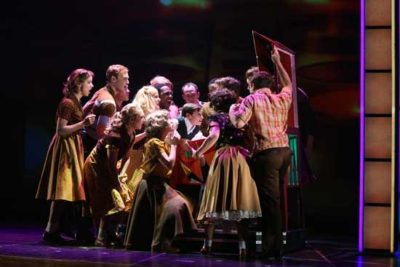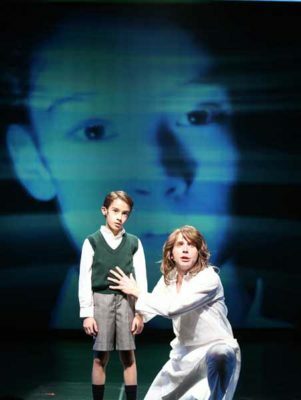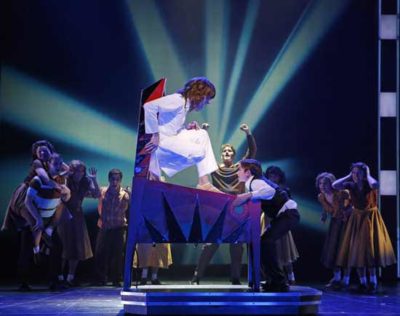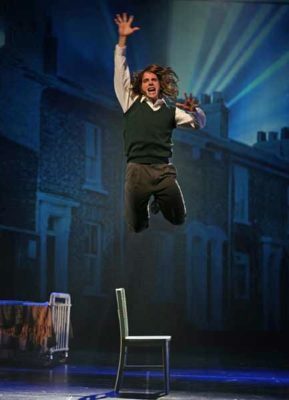The Who’s Tommy
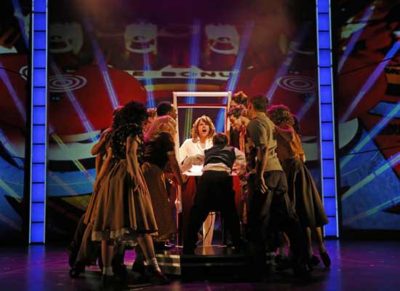
Music and Lyrics by Pete Townshend
Additional Lyrics by John Entwistle and Keith Moon
Book by Pete Townshend and Des McAnuff
Directed by Jim Corti
Conducted by Tom Vendafreddo
Produced by Paramount Theatre
Rock Opera Delivers Incomparable Spectacle and Energy
Paramount’s production values are a reliable reward for making the trip out to Aurora. The Who’s Tommy gives the design team an opportunity to fill the stage with constant delights that always supplement instead of overshadowing the show. Combined with a fast-paced and nearly constant music mostly adapted from the The Who’s 1969 album, this show dazzles the senses and lasts just the right amount of time.
The strength of this book is that it is almost entirely The Who’s music, and avoids the endless spoken dialogue in most musicals. Director Jim Corti clearly understood this, which is why the show moves so quickly, and scenic designer Linda Buchanan constructed this world with mobile beams that smoothly move during songs to symbolize different locales without the need for black-outs. The flaw is Corti’s direction doesn’t do much to clarify the story beyond what the album gives us. A young British couple meets during World War II and gets married, making them Captain and Mrs. Walker (David Schlumpf and Hillary Marren). He is reported killed in action, leaving behind a son, Tommy, and Mrs. Walker takes a new lover. When the Captain returns from a German P.O.W. camp, he is enraged by this totally innocent betrayal, and murders his unwitting rival in front of the four-year-old Tommy (Peyton Owen).
Tommy’s parents demand that he completely forget the incident, and never speak of it. Deeply traumatized, he develops a psychological block that prevents him from hearing, seeing, or speaking at all. The Captain is acquitted, and Tommy grows into a ten-year-old (Ricky Falbo) with only the comfort of mystical messages from his future adult self (Devin Desantis). Luckily, his future self is a messianic character, because everybody else in this play is completely evil and stupid. Tommy gets molested by his Uncle Ernie (Jake Klinkhammer), tortured by his Cousin Kevin (Liam Quealy), and at one point his father takes him to a prostitute (Meghan Murphy), but leaves in disgust when he sees her taking drugs.
When the chorus leaves after a dance number, we find Tommy in the middle of a game of pinball, which he’s exceptionally good at. Observers speculate it’s because he doesn’t get distracted by the lights and noises. As Tommy grows into an adult he gains fame for his pinball skill, but his parents despair of him ever communicating. In frustration, his mother smashes a mirror we are belatedly told he was transfixed by, which removes his psychological block. His family capitalizes on his now even greater fame, while adoring fans flock to him. The mob asks him how to be like him, and he replies that fifteen years of abuse and sensory deprivation isn’t a good trade-off for pinball wizardry. This enrages them, for some reason, and they turn on him.
Reading about other productions, I get the feeling the story I received wasn’t quite the one Townshend intended. I find it strange there was no moment of Tommy discovering the pinball machine; he’s just suddenly flailing away at when the chorus line disperses. I’m still not sure what the deal with the drug-dealing prostitute was, but she disappears after one song. Mostly, I just hated the characters so much I didn’t want them to get any kind of redemption, and felt when they did it rang hollow. The only way I can justify Tommy’s reconciliation with his family is that he is unaware they were the ones fondling and beating him, which is an interpretation that disempowers him. Part of my difficulty following the play’s plot or intent is because the musical completely reversed the album’s message by Tommy denying having any particular spiritual knowledge, but partly it is Corti’s directing presumed too much audience prior knowledge, particularly given how the musical differs from the album and movie.
However, that hardly detracts from the delights of the show. The ensemble’s singing is obviously more forceful than The Who’s. Desantis puts power into his high notes, and is warm and charismatic as the lead, while always retaining Tommy’s basic innocence. He has an easy connection with the child actors, who have risen to the challenges this work presents to them marvelously. I questioned the staginess of Tommy’s blindness, but he is supposed to be catatonic, not just disabled. Brock Clawson’s choreography, though most noticeable for a few major numbers, stays true to the complexity and intensity of the music. The band under Tom Vandafreddo fully conveys the emotional impact of every song.
True to rock concerts, the greatest pleasure in seeing The Who’s Tommy live is the way Theresa Ham, Greg Hofmann, and Mike Tutaj filled the stage with costumes, lights, and projections. The shift in costumes from burnt orange to black and white patterns had an otherworldly effect. But the intricacy of the electronic visuals was what best brought out my sense of wonder. You can get lost in the projections like Tommy did in his mirror, and without giving away all the surprises, I can say the visual elements only get better after he regains his sight. Tommy says his happiness comes from finally experiencing what others take for granted instead of being trapped in his head, and this show will make you glad for everything you can see and hear.
Highly Recommended
Jacob Davis
For more information, see The Who’s Tommy’s page at Theatre in Chicago.
Playing at Paramount Theatre, 23 East Galena Boulevard, Aurora, Illinois.

